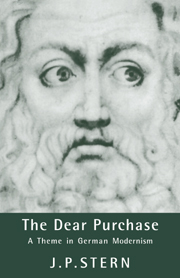2 - Reality
Published online by Cambridge University Press: 04 December 2009
Summary
What do these writers seek to purchase? All manner of things which they call by all manner of names, but above all they call it ‘Wirklichkeit’. What this word expresses in modern German literature is a concept and a feeling, a threat, and a goal. ‘Reality’, in this era, is a divinity which has its gospels, its liturgies and commandments; it is something to be accepted unquestioningly because to the metaphysicians it looks metaphysical, to the empiricist the epitome of empiricism; to the Marxist it is the product of economic forces, while to the psychologist it is, on the contrary, the foil of psychic forces; to the politician its promise is a vote-catching device, while the critics use it as a hold all for everything that won't go into their ‘formal’ or ‘literary’ arguments. Small wonder that, as man made divinities tend to be, ‘reality’ is just about the most ambiguous term we have. A history, however sketchy, of what the word meant at various times should help us to understand how its strange hypostatisations came about. I am not proposing to answer the question, ‘What is reality?’, or even ‘What is the true meaning of the word?’ My purpose is (1) to outline the various closely related meanings of the word ‘Wirklichkeit’ and of its synonyms throughout its very long history; (2) to describe the polarisation of meanings which occurred in the course of the nineteenth century, and Nietzsche's part in making the new polarity available to his literary heirs; (3) to illustrate the way German literature became involved in this process in the first decade of our century; and, finally, (4) to point to some of its political implications.
Information
- Type
- Chapter
- Information
- The Dear PurchaseA Theme in German Modernism, pp. 61 - 83Publisher: Cambridge University PressPrint publication year: 1995
